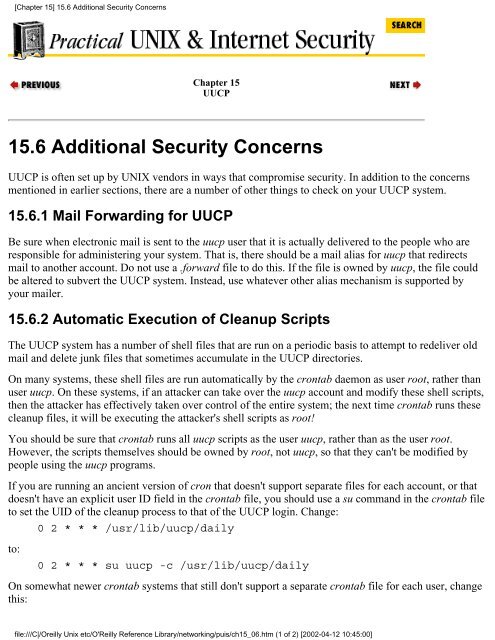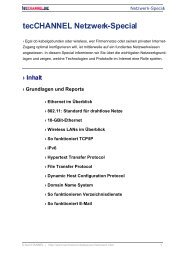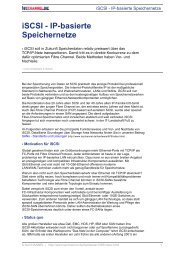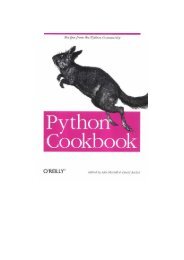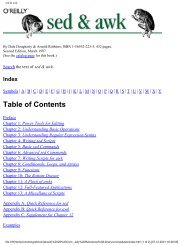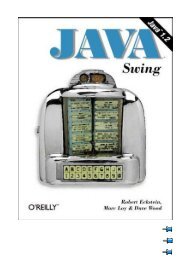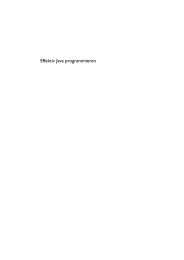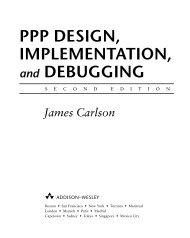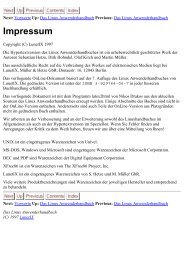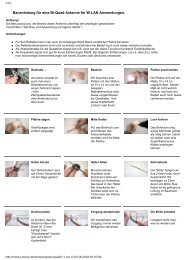- Page 1 and 2:
Practical UNIX & Internet Security
- Page 3 and 4:
Index Search | Symbols | A | B | C
- Page 5 and 6:
Index Search | Symbols | A | B | C
- Page 7 and 8:
Index 8.8.3.1. Joetest: a simple pa
- Page 9 and 10:
Index American Society for Industri
- Page 11 and 12:
Index who is logged in 10.1.2. utmp
- Page 13 and 14:
Index Search | Symbols | A | B | C
- Page 15 and 16:
Index 11.1. Programmed Threats: Def
- Page 17 and 18:
Index modems and : 14.5.1. Hooking
- Page 19 and 20:
Index Search | Symbols | A | B | C
- Page 21 and 22:
Index scripts 18.2. Running a Secur
- Page 23 and 24:
Index 26.2.2. Federal Jurisdiction
- Page 25 and 26:
Index contacting administrator of :
- Page 27 and 28:
Index E.4.3. COPS (Computer Oracle
- Page 29 and 30:
Index 14.4.4.2. Protection against
- Page 31 and 32:
Index Search | Symbols | A | B | C
- Page 33 and 34:
Index denial-of-service attacks 1.5
- Page 35 and 36:
Index Digital Signature Algorithm :
- Page 37 and 38:
Index domains : 19.4.3. NIS Domains
- Page 39 and 40:
Index Search | Symbols | A | B | C
- Page 41 and 42:
Index embedded commands : (see comm
- Page 43 and 44:
Index 8.6. The UNIX Encrypted Passw
- Page 45 and 46:
Index /etc/halt command : 24.2.6. A
- Page 47 and 48:
Index eavesdropping by : 12.3.1.2.
- Page 49 and 50:
Index Search | Symbols | A | B | C
- Page 51 and 52:
Index locating largest : 25.2.2.1.
- Page 53 and 54:
Index checklist for : A.1.1.20. Cha
- Page 55 and 56:
Index 11.1.2. Back Doors and Trap D
- Page 57 and 58:
Index GIDs (group identifiers) 1.4.
- Page 59 and 60:
Index Search | Symbols | A | B | C
- Page 61 and 62:
Index 24.4.1.5. Changes to the /etc
- Page 63 and 64:
Index 17.1.3. The /etc/inetd Progra
- Page 65 and 66:
Index Internet Packet Exchange (IPX
- Page 67 and 68:
Index Search | Symbols | A | B | C
- Page 69 and 70:
Index keyserv process 19.3.1.1. Pro
- Page 71 and 72:
Index Search | Symbols | A | B | C
- Page 73 and 74:
Index vendor liability : 18.5.2. Tr
- Page 75 and 76:
Index per-site : 10.7.1. Per-Site L
- Page 77 and 78:
Index passwords : 3.3. Entering You
- Page 79 and 80:
Index lsof program : 25.2.2.7. Hidd
- Page 81 and 82:
Index sending via CGI scripts : 18.
- Page 83 and 84:
Index message flooding : 25.3.2. Me
- Page 85 and 86:
Index Muffet, Alec : 10.5.3.1. Bewa
- Page 87 and 88:
Index national security : 26.2.2. F
- Page 89 and 90:
Index passwords for : 17.4. Securit
- Page 91 and 92:
Index checklist for : A.1.1.19. Cha
- Page 93 and 94:
Index nonrepudiation : 6.5. Message
- Page 95 and 96:
Index open command : 23.2. Tips on
- Page 97 and 98:
Index Search | Symbols | A | B | C
- Page 99 and 100:
Index avoiding conventional 8.8. Ad
- Page 101 and 102:
Index 23.4. Tips on Writing SUID/SG
- Page 103 and 104:
Index 5.3.2. Common umask Values UU
- Page 105 and 106:
Index 2.3. Cost-Benefit Analysis 2.
- Page 107 and 108:
Index privacy 2.1. Planning Your Se
- Page 109 and 110:
Index ps command 6.6.2. des: The Da
- Page 111 and 112:
Index Search | Symbols | A | B | C
- Page 113 and 114:
Index 7.4.5. Backups Across the Net
- Page 115 and 116:
Index FTP : 17.3.2.5. Restricting F
- Page 117 and 118:
Index immutable files and : 9.1.1.
- Page 119 and 120:
Index Search | Symbols | A | B | C
- Page 121 and 122:
Index 9.1.2. Read-only Filesystems
- Page 123 and 124:
Index 7.1.6. Security for Backups 7
- Page 125 and 126:
Index 17.3.4. Simple Mail Transfer
- Page 127 and 128:
Index on directories : 5.5.6. SGID
- Page 129 and 130:
Index Simple Network Management Pro
- Page 131 and 132:
Index Software Publishers Associati
- Page 133 and 134:
Index string command : 12.3.5.2. X
- Page 135 and 136:
Index SURFnet : F.3.4.25. Netherlan
- Page 137 and 138:
Index message authentication : 6.5.
- Page 139 and 140:
Index Search | Symbols | A | B | C
- Page 141 and 142:
Index versus rlogin : 17.3.18. rlog
- Page 143 and 144:
Index 8.4.3. Finding Dormant Accoun
- Page 145 and 146:
Index 18.5. Risks of Web Browsers 1
- Page 147 and 148:
Index transmitters, radio : 12.2.1.
- Page 149 and 150:
Index Search | Symbols | A | B | C
- Page 151 and 152:
Index processes : (see processes) p
- Page 153 and 154:
Index 8.4. Managing Dormant Account
- Page 155 and 156:
Index /usr/sbin/rexecd : (see rexec
- Page 157 and 158:
Index Search | Symbols | A | B | C
- Page 159 and 160:
Index bacteria programs : 11.1.7. B
- Page 161 and 162:
Index 18.2.5. Other Issues authenti
- Page 163 and 164:
Index WRITE= command : 15.5.2. Perm
- Page 165 and 166:
Index Search | Symbols | A | B | C
- Page 167 and 168:
[Chapter 12] 12.3 Protecting Data 1
- Page 169 and 170:
[Chapter 12] 12.3 Protecting Data M
- Page 171 and 172:
[Chapter 12] 12.3 Protecting Data O
- Page 173 and 174:
[Chapter 12] 12.3 Protecting Data p
- Page 175 and 176:
[Chapter 12] 12.3 Protecting Data t
- Page 177 and 178:
[Chapter 16] TCP/IP Networks connec
- Page 179 and 180:
[Chapter 16] TCP/IP Networks organi
- Page 181 and 182:
[Chapter 7] Backups Making backups
- Page 183 and 184:
[Chapter 7] Backups circumstances.[
- Page 185 and 186:
[Chapter 7] Backups ● An incremen
- Page 187 and 188:
[Chapter 7] Backups or other proble
- Page 189 and 190:
[Chapter 7] Backups damage or destr
- Page 191 and 192:
[Chapter 7] Backups example, you ca
- Page 193 and 194:
[Chapter 5] 5.2 Using File Permissi
- Page 195 and 196:
[Chapter 5] 5.2 Using File Permissi
- Page 197 and 198:
[Chapter 5] 5.2 Using File Permissi
- Page 199 and 200:
[Chapter 5] 5.2 Using File Permissi
- Page 201 and 202:
[Chapter 17] 17.3 Primary UNIX Netw
- Page 203 and 204:
[Chapter 17] 17.3 Primary UNIX Netw
- Page 205 and 206:
To set up anonymous FTP, you must c
- Page 207 and 208:
[Chapter 17] 17.3 Primary UNIX Netw
- Page 209 and 210:
[Chapter 17] 17.3 Primary UNIX Netw
- Page 211 and 212:
[Chapter 17] 17.3 Primary UNIX Netw
- Page 213 and 214:
[Chapter 17] 17.3 Primary UNIX Netw
- Page 215 and 216:
[Chapter 17] 17.3 Primary UNIX Netw
- Page 217 and 218:
[Chapter 17] 17.3 Primary UNIX Netw
- Page 219 and 220:
[Chapter 17] 17.3 Primary UNIX Netw
- Page 221 and 222:
[Chapter 17] 17.3 Primary UNIX Netw
- Page 223 and 224:
[Chapter 17] 17.3 Primary UNIX Netw
- Page 225 and 226:
[Chapter 17] 17.3 Primary UNIX Netw
- Page 227 and 228:
[Chapter 17] 17.3 Primary UNIX Netw
- Page 229 and 230:
[Chapter 15] UUCP 15. UUCP Contents
- Page 231 and 232:
[Chapter 15] UUCP You can also use
- Page 233 and 234:
[Chapter 15] UUCP After the files a
- Page 235 and 236:
[Chapter 5] The UNIX Filesystem 5.1
- Page 237 and 238:
[Chapter 5] The UNIX Filesystem con
- Page 239 and 240:
Note that we said "usually." A clev
- Page 241 and 242:
[Chapter 5] The UNIX Filesystem 10.
- Page 243 and 244:
[Chapter 19] 19.4 Sun's Network Inf
- Page 245 and 246:
[Chapter 19] 19.4 Sun's Network Inf
- Page 247 and 248:
[Chapter 19] 19.4 Sun's Network Inf
- Page 249 and 250:
[Chapter 11] 11.5 Protecting Yourse
- Page 251 and 252:
[Chapter 11] 11.5 Protecting Yourse
- Page 253 and 254:
[Chapter 11] 11.5 Protecting Yourse
- Page 255 and 256:
field is matched by the cron daemon
- Page 257 and 258:
[Chapter 11] 11.5 Protecting Yourse
- Page 259 and 260:
[Chapter 18] 18.2 Running a Secure
- Page 261 and 262:
[Chapter 18] 18.2 Running a Secure
- Page 263 and 264:
[Chapter 18] 18.2 Running a Secure
- Page 265 and 266:
[Chapter 18] 18.2 Running a Secure
- Page 267 and 268:
[Chapter 20] 20.2 Server-Side NFS S
- Page 269 and 270:
[Chapter 20] 20.2 Server-Side NFS S
- Page 271 and 272:
[Chapter 20] 20.2 Server-Side NFS S
- Page 273 and 274:
[Chapter 19] 19.5 Sun's NIS+ Entiti
- Page 275 and 276:
[Chapter 19] 19.5 Sun's NIS+ Like U
- Page 277 and 278:
[Chapter 19] 19.5 Sun's NIS+ Enter
- Page 279 and 280:
[Chapter 26] 26.4 Other Liability 2
- Page 281 and 282:
[Chapter 26] 26.4 Other Liability
- Page 283 and 284:
[Chapter 26] 26.4 Other Liability c
- Page 285 and 286:
[Chapter 26] 26.4 Other Liability l
- Page 287 and 288:
[Chapter 1] 1.4 Security and UNIX s
- Page 289 and 290:
[Chapter 1] 1.4 Security and UNIX A
- Page 291 and 292:
[Chapter 2] Policies and Guidelines
- Page 293 and 294:
[Chapter 2] Policies and Guidelines
- Page 295 and 296:
[Chapter 17] 17.2 Controlling Acces
- Page 297 and 298:
[Chapter 13] 13.2 On the Job 13.2 O
- Page 299 and 300:
[Chapter 13] 13.2 On the Job has ph
- Page 301 and 302:
[Chapter 12] 12.2 Protecting Comput
- Page 303 and 304:
[Chapter 12] 12.2 Protecting Comput
- Page 305 and 306:
[Chapter 12] 12.2 Protecting Comput
- Page 307 and 308:
[Chapter 12] 12.2 Protecting Comput
- Page 309 and 310:
[Chapter 12] 12.2 Protecting Comput
- Page 311 and 312:
[Chapter 12] 12.2 Protecting Comput
- Page 313 and 314:
[Chapter 12] 12.2 Protecting Comput
- Page 315 and 316:
[Chapter 8] Defending Your Accounts
- Page 317 and 318:
[Chapter 8] Defending Your Accounts
- Page 319 and 320:
[Chapter 8] Defending Your Accounts
- Page 321 and 322:
[Chapter 8] Defending Your Accounts
- Page 323 and 324:
[Chapter 8] Defending Your Accounts
- Page 325 and 326:
[Chapter 15] 15.4 Security in Versi
- Page 327 and 328:
[Chapter 15] 15.4 Security in Versi
- Page 329 and 330:
[Chapter 15] 15.4 Security in Versi
- Page 331 and 332:
[Chapter 18] 18.3 Controlling Acces
- Page 333 and 334:
[Chapter 18] 18.3 Controlling Acces
- Page 335 and 336:
[Chapter 18] 18.3 Controlling Acces
- Page 337 and 338:
[Chapter 23] 23.2 Tips on Avoiding
- Page 339 and 340:
[Chapter 23] 23.2 Tips on Avoiding
- Page 341 and 342:
[Chapter 23] 23.2 Tips on Avoiding
- Page 343 and 344:
[Chapter 23] 23.2 Tips on Avoiding
- Page 345 and 346:
[Chapter 10] 10.3 Program-Specific
- Page 347 and 348:
[Chapter 10] 10.3 Program-Specific
- Page 349 and 350:
[Chapter 10] 10.3 Program-Specific
- Page 351 and 352:
[Chapter 18] 18.4 Avoiding the Risk
- Page 353 and 354:
[Chapter 10] 10.2 The acct/pacct Pr
- Page 355 and 356:
[Chapter 3] Users and Passwords Cha
- Page 357 and 358:
[Chapter 3] Users and Passwords Alt
- Page 359 and 360:
[Chapter 8] 8.8 Administrative Tech
- Page 361 and 362:
[Chapter 8] 8.8 Administrative Tech
- Page 363 and 364:
[Chapter 8] 8.8 Administrative Tech
- Page 365 and 366:
[Chapter 8] 8.8 Administrative Tech
- Page 367 and 368:
[Chapter 8] 8.4 Managing Dormant Ac
- Page 369 and 370:
# Gives a list of users who have no
- Page 371 and 372:
[Chapter 8] 8.7 One-Time Passwords
- Page 373 and 374:
[Chapter 8] 8.7 One-Time Passwords
- Page 375 and 376:
[Chapter 8] 8.7 One-Time Passwords
- Page 377 and 378:
[Chapter 8] 8.7 One-Time Passwords
- Page 379 and 380:
[Chapter 24] 24.4 Cleaning Up After
- Page 381 and 382:
[Chapter 24] 24.4 Cleaning Up After
- Page 383 and 384:
[Appendix A] UNIX Security Checklis
- Page 385 and 386:
[Appendix A] UNIX Security Checklis
- Page 387 and 388:
[Appendix A] UNIX Security Checklis
- Page 389 and 390:
[Appendix A] UNIX Security Checklis
- Page 391 and 392:
[Appendix A] UNIX Security Checklis
- Page 393 and 394:
[Appendix A] UNIX Security Checklis
- Page 395 and 396:
[Appendix A] UNIX Security Checklis
- Page 397 and 398:
[Appendix A] UNIX Security Checklis
- Page 399 and 400:
[Appendix A] UNIX Security Checklis
- Page 401 and 402:
[Appendix A] UNIX Security Checklis
- Page 403 and 404:
[Chapter 3] 3.6 The Care and Feedin
- Page 405 and 406:
[Chapter 3] 3.6 The Care and Feedin
- Page 407 and 408:
[Chapter 3] 3.6 The Care and Feedin
- Page 409 and 410:
[Chapter 3] 3.3 Entering Your Passw
- Page 411 and 412:
[Chapter 10] 10.7 Handwritten Logs
- Page 413 and 414:
[Chapter 10] 10.7 Handwritten Logs
- Page 415 and 416:
[Chapter 4] Users, Groups, and the
- Page 417 and 418:
[Chapter 4] Users, Groups, and the
- Page 419 and 420:
[Chapter 4] Users, Groups, and the
- Page 421 and 422:
[Chapter 4] Users, Groups, and the
- Page 423 and 424:
[Chapter 16] 16.2 IPv4: The Interne
- Page 425 and 426:
[Chapter 16] 16.2 IPv4: The Interne
- Page 427 and 428:
[Chapter 16] 16.2 IPv4: The Interne
- Page 429 and 430:
[Chapter 16] 16.2 IPv4: The Interne
- Page 431 and 432:
[Chapter 16] 16.2 IPv4: The Interne
- Page 433 and 434:
[Chapter 16] 16.2 IPv4: The Interne
- Page 435 and 436:
[Chapter 16] 16.2 IPv4: The Interne
- Page 437 and 438:
[Appendix F] Organizations F. Organ
- Page 439 and 440:
[Appendix F] Organizations F.1.5 In
- Page 441 and 442:
[Appendix F] Organizations http://w
- Page 443 and 444:
[Chapter 19] 19.3 Secure RPC (AUTH_
- Page 445 and 446:
[Chapter 19] 19.3 Secure RPC (AUTH_
- Page 447 and 448:
[Chapter 19] 19.3 Secure RPC (AUTH_
- Page 449 and 450:
[Appendix C] C.4 The kill Command
- Page 451 and 452:
[Chapter 15] 15.7 Early Security Pr
- Page 453 and 454:
[Chapter 6] 6.4 Common Cryptographi
- Page 455 and 456:
Diffie-Hellman Key exchange protoco
- Page 457 and 458:
[Chapter 6] 6.4 Common Cryptographi
- Page 459 and 460:
[Chapter 6] 6.4 Common Cryptographi
- Page 461 and 462:
the modular inverse of e mod (n). I
- Page 463 and 464:
[Chapter 6] 6.4 Common Cryptographi
- Page 465 and 466:
[Chapter 6] 6.4 Common Cryptographi
- Page 467 and 468:
[Appendix F] F.3 Emergency Response
- Page 469 and 470:
[Appendix F] F.3 Emergency Response
- Page 471 and 472:
[Appendix F] F.3 Emergency Response
- Page 473 and 474:
[Appendix F] F.3 Emergency Response
- Page 475 and 476:
[Appendix F] F.3 Emergency Response
- Page 477 and 478:
[Chapter 8] 8.5 Protecting the root
- Page 479 and 480:
[Chapter 11] Protecting Against Pro
- Page 481 and 482:
[Chapter 11] Protecting Against Pro
- Page 483 and 484:
[Chapter 11] Protecting Against Pro
- Page 485 and 486:
[Chapter 11] Protecting Against Pro
- Page 487 and 488:
[Chapter 11] Protecting Against Pro
- Page 489 and 490:
[Chapter 9] 9.2 Detecting Change 9.
- Page 491 and 492:
[Chapter 9] 9.2 Detecting Change {
- Page 493 and 494:
[Chapter 9] 9.2 Detecting Change it
- Page 495 and 496:
[Chapter 14] 14.6 Additional Securi
- Page 497 and 498:
[Chapter 14] 14.3 The RS-232 Serial
- Page 499 and 500:
[Chapter 14] 14.3 The RS-232 Serial
- Page 501 and 502:
[Chapter 14] 14.5 Modems and UNIX C
- Page 503 and 504:
[Chapter 14] 14.5 Modems and UNIX u
- Page 505 and 506:
[Chapter 14] 14.5 Modems and UNIX I
- Page 507 and 508:
[Chapter 14] 14.5 Modems and UNIX
- Page 509 and 510:
[Chapter 16] 16.3 IP Security Ether
- Page 511 and 512:
[Chapter 16] 16.3 IP Security that
- Page 513 and 514:
[Chapter 7] 7.4 Software for Backup
- Page 515 and 516:
[Chapter 7] 7.4 Software for Backup
- Page 517 and 518:
[Chapter 7] 7.4 Software for Backup
- Page 519 and 520:
[Chapter 1] 1.3 History of UNIX was
- Page 521 and 522:
[Chapter 1] 1.3 History of UNIX qui
- Page 523 and 524:
[Chapter 1] 1.3 History of UNIX Des
- Page 525 and 526:
[Chapter 2] 2.2 Risk Assessment 2.2
- Page 527 and 528:
[Chapter 2] 2.2 Risk Assessment 2.2
- Page 529 and 530:
[Chapter 2] 2.5 The Problem with Se
- Page 531 and 532:
[Chapter 2] 2.5 The Problem with Se
- Page 533 and 534:
[Chapter 19] 19.2 Sun's Remote Proc
- Page 535 and 536:
[Chapter 19] 19.2 Sun's Remote Proc
- Page 537 and 538:
[Chapter 25] 25.2 Overload Attacks
- Page 539 and 540:
[Chapter 25] 25.2 Overload Attacks
- Page 541 and 542:
[Chapter 25] 25.2 Overload Attacks
- Page 543 and 544:
[Chapter 25] 25.2 Overload Attacks
- Page 545 and 546:
[Chapter 25] 25.2 Overload Attacks
- Page 547 and 548:
[Chapter 25] 25.2 Overload Attacks
- Page 549 and 550:
[Chapter 23] 23.8 Picking a Random
- Page 551 and 552: [Chapter 4] 4.3 su: Changing Who Yo
- Page 553 and 554: [Chapter 4] 4.3 su: Changing Who Yo
- Page 555 and 556: [Chapter 4] 4.3 su: Changing Who Yo
- Page 557 and 558: [Chapter 10] Auditing and Logging C
- Page 559 and 560: [Chapter 10] Auditing and Logging v
- Page 561 and 562: [Chapter 10] Auditing and Logging f
- Page 563 and 564: [Chapter 10] Auditing and Logging f
- Page 565 and 566: [Chapter 10] Auditing and Logging 1
- Page 567 and 568: [Chapter 23] 23.3 Tips on Writing N
- Page 569 and 570: [Chapter 3] 3.2 Passwords 3.2 Passw
- Page 571 and 572: [Chapter 3] 3.2 Passwords that runs
- Page 573 and 574: [Chapter 3] 3.2 Passwords 3.2.6 Con
- Page 575 and 576: [Chapter 19] 19.6 Kerberos 19.6.1 K
- Page 577 and 578: [Chapter 19] 19.6 Kerberos ● ●
- Page 579 and 580: [Chapter 19] 19.6 Kerberos electron
- Page 581 and 582: [Chapter 19] 19.6 Kerberos But Kerb
- Page 583 and 584: [Chapter 6] 6.5 Message Digests and
- Page 585 and 586: [Chapter 6] 6.5 Message Digests and
- Page 587 and 588: [Chapter 6] 6.5 Message Digests and
- Page 589 and 590: [Chapter 23] 23.5 Tips on Using Pas
- Page 591 and 592: [Chapter 2] 2.4 Policy 2.4 Policy C
- Page 593 and 594: [Chapter 2] 2.4 Policy 2.4.3 Guidel
- Page 595 and 596: [Chapter 2] 2.4 Policy Spaf's first
- Page 597 and 598: [Chapter 11] 11.3 Authors 11.3 Auth
- Page 599 and 600: [Chapter 7] 7.3 Backing Up System F
- Page 601: [Chapter 7] 7.3 Backing Up System F
- Page 605 and 606: [Chapter 6] 6.2 What Is Encryption?
- Page 607 and 608: [Chapter 27] Who Do You Trust? Chap
- Page 609 and 610: [Chapter 27] Who Do You Trust? 27.1
- Page 611 and 612: [Chapter 27] Who Do You Trust? 26.4
- Page 613 and 614: [Chapter 13] Personnel Security con
- Page 615 and 616: [Chapter 3] 3.4 Changing Your Passw
- Page 617 and 618: [Chapter 9] Integrity Management Ch
- Page 619 and 620: [Chapter 9] Integrity Management 9.
- Page 621 and 622: [Chapter 9] Integrity Management th
- Page 623 and 624: [Chapter 24] 24.2 Discovering an In
- Page 625 and 626: [Chapter 24] 24.2 Discovering an In
- Page 627 and 628: [Chapter 24] 24.2 Discovering an In
- Page 629 and 630: [Chapter 24] 24.2 Discovering an In
- Page 631 and 632: [Chapter 24] 24.2 Discovering an In
- Page 633 and 634: [Chapter 26] 26.2 Criminal Prosecut
- Page 635 and 636: [Chapter 26] 26.2 Criminal Prosecut
- Page 637 and 638: [Chapter 26] 26.2 Criminal Prosecut
- Page 639 and 640: [Chapter 26] 26.2 Criminal Prosecut
- Page 641 and 642: [Chapter 24] 24.5 An Example If the
- Page 643 and 644: [Chapter 7] 7.2 Sample Backup Strat
- Page 645 and 646: [Chapter 7] 7.2 Sample Backup Strat
- Page 647 and 648: [Chapter 7] 7.2 Sample Backup Strat
- Page 649 and 650: [Chapter 10] 10.8 Managing Log File
- Page 651 and 652: Chapter 6 Cryptography 6.6 Encrypti
- Page 653 and 654:
[Chapter 6] 6.6 Encryption Programs
- Page 655 and 656:
[Chapter 6] 6.6 Encryption Programs
- Page 657 and 658:
[Chapter 6] 6.6 Encryption Programs
- Page 659 and 660:
[Chapter 6] 6.6 Encryption Programs
- Page 661 and 662:
[Chapter 6] 6.6 Encryption Programs
- Page 663 and 664:
[Chapter 6] 6.6 Encryption Programs
- Page 665 and 666:
[Chapter 21] Firewalls 21.1 What's
- Page 667 and 668:
[Chapter 21] Firewalls connections
- Page 669 and 670:
[Chapter 21] Firewalls kernel will
- Page 671 and 672:
[Chapter 21] Firewalls If you allow
- Page 673 and 674:
[Chapter 21] Firewalls ● ● Runs
- Page 675 and 676:
[Chapter 14] Telephone Security Cha
- Page 677 and 678:
[Chapter 10] 10.6 Swatch: A Log Fil
- Page 679 and 680:
[Chapter 10] 10.6 Swatch: A Log Fil
- Page 681 and 682:
[Chapter 14] 14.4 Modems and Securi
- Page 683 and 684:
[Chapter 14] 14.4 Modems and Securi
- Page 685 and 686:
[Chapter 14] 14.4 Modems and Securi
- Page 687 and 688:
[Chapter 8] 8.6 The UNIX Encrypted
- Page 689 and 690:
[Chapter 8] 8.6 The UNIX Encrypted
- Page 691 and 692:
[Chapter 17] TCP/IP Services Chapte
- Page 693 and 694:
[Chapter 17] TCP/IP Services to the
- Page 695 and 696:
[Chapter 17] TCP/IP Services daytim
- Page 697 and 698:
[Chapter 5] 5.6 Device Files consol
- Page 699 and 700:
[Chapter 15] 15.5 Security in BNU U
- Page 701 and 702:
[Chapter 15] 15.5 Security in BNU U
- Page 703 and 704:
[Chapter 15] 15.5 Security in BNU U
- Page 705 and 706:
[Chapter 15] 15.5 Security in BNU U
- Page 707 and 708:
[Appendix C] C.5 Starting Up UNIX a
- Page 709 and 710:
[Chapter 26] Computer Security and
- Page 711 and 712:
[Chapter 24] Discovering a Break-in
- Page 713 and 714:
[Chapter 24] Discovering a Break-in
- Page 715 and 716:
[Chapter 24] 24.6 Resuming Operatio
- Page 717 and 718:
[Chapter 25] 25.3 Network Denial of
- Page 719 and 720:
[Chapter 25] 25.3 Network Denial of
- Page 721 and 722:
[Preface] Which UNIX System? Which
- Page 723 and 724:
[Preface] Which UNIX System? to pro
- Page 725 and 726:
[Appendix D] Paper Sources D. Paper
- Page 727 and 728:
[Appendix D] Paper Sources Sebastop
- Page 729 and 730:
[Appendix D] Paper Sources D.1.6 Cr
- Page 731 and 732:
[Appendix D] Paper Sources Pfleeger
- Page 733 and 734:
[Appendix D] Paper Sources year pri
- Page 735 and 736:
[Appendix D] Paper Sources C.5 Star
- Page 737 and 738:
[Appendix C] UNIX Processes such as
- Page 739 and 740:
[Appendix C] UNIX Processes root 20
- Page 741 and 742:
[Appendix C] UNIX Processes michell
- Page 743 and 744:
[Appendix B] B.3 SUID and SGID File
- Page 745 and 746:
[Appendix B] B.3 SUID and SGID File
- Page 747 and 748:
[Appendix B] B.3 SUID and SGID File
- Page 749 and 750:
[Appendix B] B.3 SUID and SGID File
- Page 751 and 752:
[Chapter 1] Introduction HACKER nou
- Page 753 and 754:
[Chapter 1] Introduction policies.
- Page 755 and 756:
[Chapter 23] Writing Secure SUID an
- Page 757 and 758:
[Chapter 23] Writing Secure SUID an
- Page 759 and 760:
[Chapter 27] 27.2 Can You Trust You
- Page 761 and 762:
[Chapter 27] 27.2 Can You Trust You
- Page 763 and 764:
[Chapter 27] 27.2 Can You Trust You
- Page 765 and 766:
[Appendix E] Electronic Resources A
- Page 767 and 768:
[Appendix E] Electronic Resources y
- Page 769 and 770:
[Appendix E] Electronic Resources E
- Page 771 and 772:
Preface ● ● ● [1] "Securing t
- Page 773 and 774:
Preface administrator or manager. I
- Page 775 and 776:
[Chapter 25] Denial of Service Atta
- Page 777 and 778:
[Chapter 2] 2.3 Cost-Benefit Analys
- Page 779 and 780:
[Chapter 2] 2.3 Cost-Benefit Analys
- Page 781 and 782:
[Chapter 6] 6.7 Encryption and U.S.
- Page 783 and 784:
[Chapter 6] 6.7 Encryption and U.S.
- Page 785 and 786:
[Chapter 5] 5.5 SUID ------s--- SGI
- Page 787 and 788:
[Chapter 5] 5.5 SUID learn more abo
- Page 789 and 790:
[Chapter 5] 5.5 SUID filesystem bou
- Page 791 and 792:
[Chapter 5] 5.9 Oddities and Dubiou
- Page 793 and 794:
[Chapter 5] 5.9 Oddities and Dubiou
- Page 795 and 796:
[Appendix E] E.4 Software Resources
- Page 797 and 798:
[Appendix E] E.4 Software Resources
- Page 799 and 800:
[Appendix E] E.4 Software Resources
- Page 801 and 802:
[Chapter 27] 27.3 Can You Trust Peo
- Page 803 and 804:
[Chapter 27] 27.3 Can You Trust Peo
- Page 805 and 806:
[Chapter 18] WWW Security Chapter 1
- Page 807 and 808:
[Chapter 18] WWW Security There are
- Page 809 and 810:
[Chapter 15] 15.2 Versions of UUCP
- Page 811 and 812:
[Chapter 8] 8.2 Monitoring File For
- Page 813 and 814:
[Chapter 5] 5.8 chgrp: Changing a F
- Page 815 and 816:
[Appendix C] C.2 Creating Processes
- Page 817 and 818:
[Chapter 8] 8.3 Restricting Logins
- Page 819 and 820:
[Chapter 5] 5.7 chown: Changing a F
- Page 821 and 822:
[Chapter 23] 23.4 Tips on Writing S
- Page 823 and 824:
[Chapter 26] 26.3 Civil Actions As
- Page 825 and 826:
[Appendix E] E.3 WWW Pages E.3.4 NI
- Page 827 and 828:
[Chapter 18] 18.6 Dependence on Thi
- Page 829 and 830:
[Chapter 10] 10.5 The UNIX System L
- Page 831 and 832:
[Chapter 10] 10.5 The UNIX System L
- Page 833 and 834:
[Chapter 10] 10.5 The UNIX System L
- Page 835 and 836:
[Chapter 6] Cryptography 6. Cryptog
- Page 837 and 838:
[Chapter 6] Cryptography The revela
- Page 839 and 840:
[Chapter 10] 10.4 Per-User Trails i
- Page 841 and 842:
[Chapter 11] 11.2 Damage 11.2 Damag
- Page 843 and 844:
[Chapter 1] 1.2 What Is an Operatin
- Page 845 and 846:
[Chapter 19] 19.7 Other Network Aut
- Page 847 and 848:
[Chapter 16] 16.4 Other Network Pro
- Page 849 and 850:
[Chapter 5] 5.4 Using Directory Per
- Page 851 and 852:
[Chapter 1] 1.5 Role of This Book 1
- Page 853 and 854:
[Chapter 23] 23.7 UNIX Pseudo-Rando
- Page 855 and 856:
[Chapter 11] 11.6 Protecting Your S
- Page 857 and 858:
[Chapter 11] 11.6 Protecting Your S
- Page 859 and 860:
[Chapter 12] 12.4 Story: A Failed S
- Page 861 and 862:
[Chapter 13] 13.3 Outsiders 13.3 Ou
- Page 863 and 864:
[Chapter 6] 6.3 The Enigma Encrypti
- Page 865 and 866:
[Chapter 17] 17.4 Security Implicat
- Page 867 and 868:
[Chapter 17] 17.4 Security Implicat
- Page 869 and 870:
[Chapter 4] 4.2 Special Usernames 4
- Page 871 and 872:
[Chapter 4] 4.2 Special Usernames 4
- Page 873 and 874:
[Chapter 20] NFS 20. NFS Contents:
- Page 875 and 876:
[Chapter 20] NFS The NFS Version 3
- Page 877 and 878:
[Chapter 20] NFS the RPC program nu
- Page 879 and 880:
[Chapter 20] NFS If the NFS client
- Page 881 and 882:
[Chapter 20] NFS the clients virtua
- Page 883 and 884:
[Chapter 20] NFS [ Library Home | D
- Page 885 and 886:
[Chapter 15] 15.3 UUCP and Security
- Page 887 and 888:
[Chapter 21] 21.4 Setting Up the Ga
- Page 889 and 890:
[Chapter 21] 21.4 Setting Up the Ga
- Page 891 and 892:
[Chapter 21] 21.4 Setting Up the Ga
- Page 893 and 894:
[Chapter 21] 21.5 Special Considera
- Page 895 and 896:
[Appendix G] Table of IP Services A
- Page 897 and 898:
[Appendix G] Table of IP Services 2
- Page 899 and 900:
[Appendix G] Table of IP Services 1
- Page 901 and 902:
[Appendix G] Table of IP Services h
- Page 903 and 904:
[Appendix G] Table of IP Services F
- Page 905 and 906:
[Chapter 20] 20.4 Improving NFS Sec
- Page 907 and 908:
[Chapter 20] 20.4 Improving NFS Sec
- Page 909 and 910:
[Chapter 20] 20.4 Improving NFS Sec
- Page 911 and 912:
[Chapter 15] 15.8 UUCP Over Network
- Page 913 and 914:
[Chapter 23] 23.6 Tips on Generatin
- Page 915 and 916:
[Chapter 5] 5.3 The umask 0666 defa
- Page 917 and 918:
[Chapter 23] 23.9 A Good Random See
- Page 919 and 920:
[Chapter 23] 23.9 A Good Random See
- Page 921 and 922:
[Chapter 12] Physical Security as d
- Page 923 and 924:
[Chapter 17] 17.6 Network Scanning
- Page 925 and 926:
[Chapter 24] 24.3 The Log Files: Di
- Page 927 and 928:
[Chapter 18] 18.5 Risks of Web Brow
- Page 929 and 930:
[Chapter 18] 18.5 Risks of Web Brow
- Page 931 and 932:
[Chapter 22] 22.4 SOCKS Figure 22.1
- Page 933 and 934:
22.4.5 SOCKS Identification Policy
- Page 935 and 936:
[Chapter 22] 22.4 SOCKS Obviously,
- Page 937 and 938:
[Chapter 22] 22.4 SOCKS [ Library H
- Page 939 and 940:
[Chapter 20] 20.3 Client-Side NFS S
- Page 941 and 942:
[Appendix F] F.2 U. S. Government O
- Page 943 and 944:
[Chapter 17] 17.5 Monitoring Your N
- Page 945 and 946:
[Chapter 19] RPC, NIS, NIS+, and Ke
- Page 947 and 948:
[Chapter 19] RPC, NIS, NIS+, and Ke
- Page 949 and 950:
[Chapter 11] 11.4 Entry environment
- Page 951 and 952:
[Chapter 3] 3.5 Verifying Your New
- Page 953 and 954:
[Chapter 3] 3.5 Verifying Your New
- Page 955 and 956:
[Chapter 21] 21.2 Building Your Own
- Page 957 and 958:
[Chapter 21] 21.2 Building Your Own
- Page 959 and 960:
[Appendix D] D.2 Security Periodica
- Page 961 and 962:
[Appendix D] D.2 Security Periodica
- Page 963 and 964:
[Chapter 14] 14.2 Serial Interfaces
- Page 965 and 966:
[Appendix C] C.3 Signals C.3 Signal
- Page 967 and 968:
[Appendix C] C.3 Signals overflows)
- Page 969 and 970:
[Chapter 27] 27.4 What All This Mea
- Page 971 and 972:
[Appendix E] E.2 Usenet Groups E.2
- Page 973 and 974:
[Chapter 15] 15.9 Summary 15.9 Summ
- Page 975 and 976:
[Preface] Scope of This Book into y
- Page 977 and 978:
[Preface] Scope of This Book Append
- Page 979 and 980:
[Preface] Conventions Used in This
- Page 981 and 982:
[Preface] Acknowledgments Acknowled
- Page 983 and 984:
[Preface] Acknowledgments [ Library
- Page 985 and 986:
[Preface] A Note to Computer Cracke
- Page 987 and 988:
[Part II] User Responsibilities Par
- Page 989 and 990:
[Part III] System Security Part III
- Page 991 and 992:
[Chapter 20] 20.5 Some Last Comment
- Page 993 and 994:
[Chapter 20] 20.5 Some Last Comment
- Page 995 and 996:
[Chapter 22] Wrappers and Proxies C
- Page 997 and 998:
[Chapter 21] 21.3 Example: Cisco Sy
- Page 999 and 1000:
destination Specifies the address o
- Page 1001 and 1002:
[Chapter 21] 21.3 Example: Cisco Sy
- Page 1003 and 1004:
[Chapter 21] 21.6 Final Comments
- Page 1005 and 1006:
[Chapter 22] 22.2 sendmail (smap/sm
- Page 1007 and 1008:
[Chapter 22] 22.2 sendmail (smap/sm
- Page 1009 and 1010:
[Chapter 22] 22.2 sendmail (smap/sm
- Page 1011 and 1012:
[Chapter 22] 22.3 tcpwrapper ● Tr
- Page 1013 and 1014:
[Chapter 22] 22.3 tcpwrapper 6. 7.
- Page 1015 and 1016:
[Chapter 22] 22.3 tcpwrapper # # /e
- Page 1017 and 1018:
} [Chapter 22] 22.3 tcpwrapper sed
- Page 1019 and 1020:
[Chapter 22] 22.6 Writing Your Own
- Page 1021 and 1022:
[Chapter 22] 22.6 Writing Your Own
- Page 1023 and 1024:
[Part VI] Handling Security Inciden
- Page 1025 and 1026:
[Appendix B] Important Files B. Imp
- Page 1027 and 1028:
[Appendix B] Important Files /etc/d
- Page 1029 and 1030:
[Appendix B] Important Files chgrp
- Page 1031 and 1032:
[Appendix B] Important Files rc? Bo


